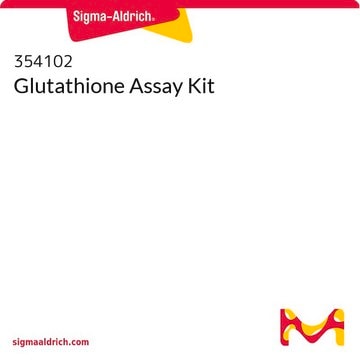MAK440
Glutathione GSH/GSSG Assay Kit
Sufficient for 100 colorimetric tests
Synonyme(s) :
GSH/GSSG Ratio Kit
Se connecterpour consulter vos tarifs contractuels et ceux de votre entreprise/organisme
About This Item
Code UNSPSC :
12161503
Nomenclature NACRES :
NA.84
Produits recommandés
Niveau de qualité
Application(s)
pharmaceutical
Méthode de détection
colorimetric
Maladie(s) pertinente(s)
Alzheimer′s disease; Parkinson′s disease; cancer; neurological disorders; aging/geriatric diseases
Température de stockage
−20°C
Description générale
Glutathione (GSH), composed of the amino acids glycine, glutamic acid, and cysteine, serves as a fundamental antioxidant within the body, playing a pivotal role in cellular defense against oxidative stress caused by reactive oxygen species (ROS). As the major free thiol in cells, GSH is instrumental in various biological processes, including the detoxification of harmful substances, the removal of hydroperoxides, and the maintenance of protein sulfhydryl groups in their reduced state. GSH achieves this by directly reducing disulfide bonds in cytoplasmic proteins to cysteines, during which it is transformed into its oxidized form, glutathione disulfide (GSSG). This cycle between reduced and oxidized forms is critical for maintaining the cellular redox balance.Glutathione functions as a cofactor for several key antioxidant enzymes, enhancing their ability to neutralize free radicals. It also plays a crucial role in the regeneration of vitamins C and E, thereby contributing to their antioxidative effects. Beyond its antioxidant properties, GSH is vital for mitochondrial function and the integrity of mitochondrial DNA (mtDNA), which is essential for energy production and cellular health. Dysregulation of glutathione levels is associated with the pathogenesis of several neurodegenerative diseases such as Alzheimer′s, Parkinson′s, and Huntington′s diseases, as well as other health conditions including cystic fibrosis, immune disorders, and cardiovascular diseases. Glutathione′s role in metabolism and cellular protection is extensive, influencing cellular proliferation, apoptosis, and overall physiological stability.
Application
The Glutathione GSH/GSSG Assay Kit may be used for:
- Cancer Research
- Diabetes Research
- Neurodegenerative Disease Research
Caractéristiques et avantages
Sensitive Detection Range: Detect Glutathione levels accurately across a wide range, from 0.01 µM to 3 µM, using only 25 μL of sample in a 96-well plate setup, ensuring highly sensitive analysis with minimal sample requirement.
Simplified Process: Experience a streamlined process with the addition of only a single working reagent and a 10 minute room temperature reaction, reducing complexity and saving valuable time and effort.
Compatibility with High-Throughput Systems: Easily incorporate our kit into high-throughput handling systems, ensuring smooth and accurate processing, enhancing efficiency in your laboratory workflow.
Simplified Process: Experience a streamlined process with the addition of only a single working reagent and a 10 minute room temperature reaction, reducing complexity and saving valuable time and effort.
Compatibility with High-Throughput Systems: Easily incorporate our kit into high-throughput handling systems, ensuring smooth and accurate processing, enhancing efficiency in your laboratory workflow.
Adéquation
The kit is suitable for the quantitative determination of reduced and oxidized glutathione (GSH/GSSG) in whole blood, plasma, serum, urine, tissue and cell extracts.
Principe
The Glutathione GSH/GSSG Assay Kit is designed to accurately measure total, reduced and oxidized glutathione in biological samples using an enzymatic method that utilizes Ellman′s Reagent (DTNB) and glutathione reductase (GR). DTNB reacts with reduced glutathione to form a yellow product. The rate of change in the optical density, measured at A412 nm, is directly proportional to the glutathione concentration in the sample. This kit can also be used to measure oxidized (GSSG) by using a specific protocol which first scavenges all GSH with 1-methyl-2-vinylpyridinium triflate.
Autres remarques
For additional information on our range of Biochemicals, please complete this form.
Code de la classe de stockage
10 - Combustible liquids
Point d'éclair (°F)
188.6 °F
Point d'éclair (°C)
87 °C
Certificats d'analyse (COA)
Recherchez un Certificats d'analyse (COA) en saisissant le numéro de lot du produit. Les numéros de lot figurent sur l'étiquette du produit après les mots "Lot" ou "Batch".
Déjà en possession de ce produit ?
Retrouvez la documentation relative aux produits que vous avez récemment achetés dans la Bibliothèque de documents.
Notre équipe de scientifiques dispose d'une expérience dans tous les secteurs de la recherche, notamment en sciences de la vie, science des matériaux, synthèse chimique, chromatographie, analyse et dans de nombreux autres domaines..
Contacter notre Service technique



